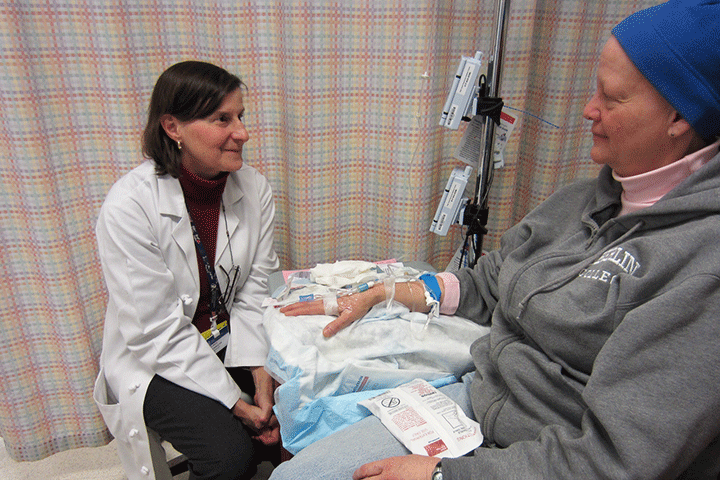Using Ice to Prevent Neuropathy

Chemotherapy-induced peripheral neuropathy is a common side effect of cancer treatment.
The burning, tingling pain, impaired sensation, and problems with fine motor movement and proprioception (your ability to perceive location and movement of your body), affect up to 40 percent of patients treated with neurotoxic agents, according to the National Cancer Institute. The agents most likely to cause neuropathy are the platinum-based drugs, such as oxaliplatin (in the FOLFIRINOX combination) and the taxanes, such as paclitaxel. If the neuropathy is severe enough, the treatment regimen can be changed and these drugs will be removed from the protocol.
“Neuropathy is a common side effect of the chemotherapy agents we use to treat pancreatic cancer, including oxaliplatin and paclitaxel,” says Allyson Ocean, M.D., a gastrointestinal oncologist and Professor of Clinical Medicine at NewYork-Presbyterian Hospital/Weill Cornell Medical Center. “Unfortunately, we don’t have effective tools to prevent neuropathy and options to treat the condition are severely limited.” But it turns out, there could be a simple and cost-effective solution: ice.
Cold Sensitivity and Neuropathy
Nearly all of the pancreatic cancer patients taking chemotherapy regimens containing oxaliplatin develop cold sensitivity during and after their infusions—and a subset of patients suffer from neuropathy, sometimes even years after treatment.
“Cold sensitivity comes on fast, often during your first oxaliplatin infusion,” says Ocean. “You get a sense of pins and needles on your hands when you’re holding cold objects and it can also create the sense that you’re swallowing shards of glass when you’re drinking cold fluids.”
Neuropathy, however, usually comes on after a few cycles of treatment, and it can worsen even after you’ve stopped treatment. Unfortunately, healing damaged nerves takes time. So if you had six months of treatment, you may need a full year to recover from chemotherapy-induced nerve damage.
The Perks of Ice
Just as cold caps can help prevent hair loss during chemotherapy treatment, applying ice to your hands and feet could help patients sidestep neuropathy. Researchers believe that exposing your hands, feet, and mouth to ice during infusions may help reduce drug distribution to the chilled tissues.
“Ice works by constricting the blood vessels and preventing blood flow to the area,” Ocean explains. “Since chemotherapeutic agents are delivered directly to the veins, constricting the blood vessels may help reduce the amount of the drug that reaches the hands, feet, and mouth.”
A small study published in the Journal of the National Comprehensive Cancer Network, reported that giving patients ice chips throughout their two-hour oxaliplatin infusion significantly reduced the intensity and duration of oral symptoms in the mouth. The longer patients kept the ice chips in their mouths, the greater the reduction in symptoms. And in a review article published in the Journal of the Advanced Practitioner in Oncology, four out of the six studies analyzed found that “peripheral cooling” reduced the severity of peripheral neuropathy.
How to Chill Out
True, dunking your hands and feet in ice water, or sporting ice booties and gloves, can be uncomfortable. But for many patients, it’s a small price to pay if it means avoiding neuropathy. You can also suck on ice chips or sip ice cold drinks during infusions to reduce the risk of cold sensitivity.
“Studies on icing to prevent neuropathy are limited, and the practice is not yet standard of care,” says Ocean. “But what patients really want is relief, and there’s certainly no harm in trying!” Without cold sensitivity, patients can handle cold drinks and food without worrying about the pain of pins and needles. And without neuropathy, they can button their shirts, write with a pen, and remain steady on their feet. Being able to easily do these things adds up to improved quality of life.





